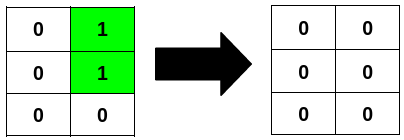3240. Minimum Number of Flips to Make Binary Grid Palindromic II
3240. Minimum Number of Flips to Make Binary Grid Palindromic II
Description
You are given an m x n binary matrix grid.
A row or column is considered palindromic if its values read the same forward and backward.
You can flip any number of cells in grid from 0 to 1, or from 1 to 0.
Return the minimum number of cells that need to be flipped to make all rows and columns palindromic , and the total number of 1‘s in grid divisible by 4.
Example 1:
1 | Input: grid = [[1,0,0],[0,1,0],[0,0,1]] |
Explanation:

Example 2:
1 | Input: grid = [[0,1],[0,1],[0,0]] |
Explanation:

Example 3:
1 | Input: grid = [[1],[1]] |
Explanation:

Constraints:
m == grid.lengthn == grid[i].length1 <= m * n <= 2 * 10^50 <= grid[i][j] <= 1
Hints/Notes
- 2024/08/04
- draw the grid
- 0x3F’s solution(checked)
- Biweekly Contest 136
Solution
Language: C++
1 | class Solution { |